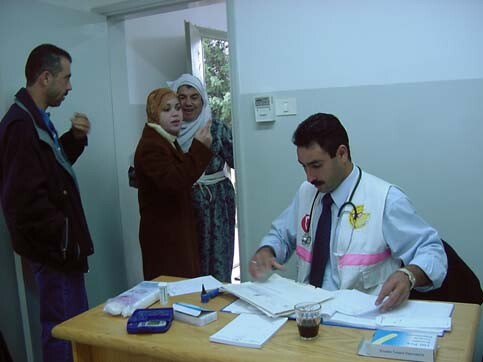
Dr. Hazem Bozeeyah in his office (Dr. Bill Dienst)
November 5, 2006, in the village of Al Zawiya, population 6000, in the Occupied West Bank
I am now working with a different medical crew, this time in the Salfit district. This Mobile Health Unit is also sponsored by Medical Relief Society. We started at our base in the town of Salfit and had to drive around the huge settlement of Ariel, the second largest settlement, (after Ma’ale Addumin) in the West Bank. We passed through the major Israeli military checkpoint of Zatara, which controls and stifles the flow of traffic between Ramallah and Nablus. I am getting used to all this oppression which now has a strange sort of normalcy. Going out through this checkpoint was uneventful; coming back in to Salfit will be another story.
I am now in the makeshift clinic in the village of Al Zawiya with Dr. Hasam Bozeeyah, a 41 year old general practitioner who received his medical training in Russian in the former Soviet republic of Kergezia. Dr. Hasam is the only doctor in this mobile health unit, and admittedly he has been overworked lately.
The cruel boycott of the Palestinian Authority, led by Israel, the USA and the European Union, collectively punishes the entire Palestinian population for democratically electing Hamas to power. Government employees have not been receiving their usual paychecks for eight months now. Consequently, schools and health care facilities affiliated with the Palestinian Authority have been on strike. Children who previously have gone to Palestinian Authority sponsored schools are wandering the street instead of being in class. Government health care facilities are only dealing with emergencies and their primary health care services are falling apart. Children are not getting their primary vaccinations, and public health endemics are in the making.
Consequently, schools and health care facilities run by international Non-Governmental Organizations (NGO’s) are now bursting at the seams with excessive demand. This leaves poor Dr. Hasam overworked. Last Thursday, he and his support staff saw 89 patients in a single day.
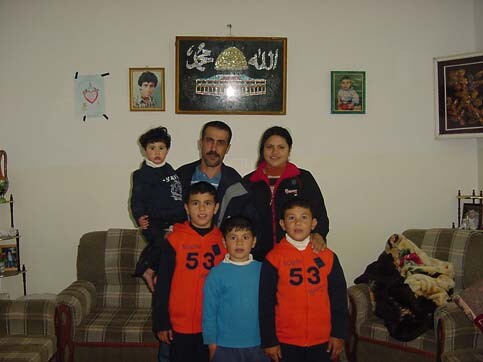
Khaled and his family. (Dr. Bill Dienst)
Today I am being called upon to do my very best to help him out. I am put in a separate room, and will try and see patients independently with the help of broken English-Arabic translations from Khaled, our driver and mobile health unit manger and a local support staff nurse’s aid, who speaks some English. The problem is that they have other responsibilities as well, and keep bobbing in-and-out of my exam room. They seem often to be out of reach just when I need them.
I did study one year of Classic Arabic (Araby Fuss-ha) a long time ago back in 1984, before I made my first trip to Palestine. I spoke better Arabic back then than I do now. Since then, the Spanish language has infiltrated my foreign language brain such that every time I try to speak Arabic, Spanish words keep popping out.
Unfortunately, my problem is not quite this simple. The colloquial Palestinian version of the Arabic language is different than Classic Arabic; far different than the Egyptian dialect, for that matter. My little book that I am carrying, called Barron’s “Getting By in Arabic,” is written in Egyptian dialect, which has limited value here-especially with rural peasant folk. Here I go as Don Quixote chasing windmills again! Well I’ll give it my best shot!
My first patient is 57 year old male with a history of Type 2 Diabetes, Hypertension and Junctional Tachycardia. He is on 7 different medications, and requests a refill. His blood sugar is 77 today, which is excellent. Fair enough. Fortunately, his medications have been written down for him in English. Unfortunately, many of the brand names used here in Palestine are different than the brand names used in the USA.
When I can figure out the generic names of these medications, it is no problem. For some of the meds written down in their brand names, I cannot. After a major struggle, I am able to work through these problems slowly and methodically, but I am way too slow to keep up with the demands of patient flow. After 3 patients, we decide this arrangement is not working, so they sit me right down in the same room next to Dr. Hasam, and we start seeing patients in tandem.
I take on the simple pediatric cases: a girl with impetigo, a boy complaining of multiple insect bites, etc. I have their adult family members write their names in Arabic for me on the prescription pad, and I write the prescriptions in English, which happens to be the universal language for health care here. Dr. Hasam translates for me in broken English, while seeing the more complex adult medical cases at the same time. He consults with me at times, when adjusting insulin for a diabetic patient with a blood sugar over 400, with a woman with a huge thyroid goiter, etc. This arrangement works much better.
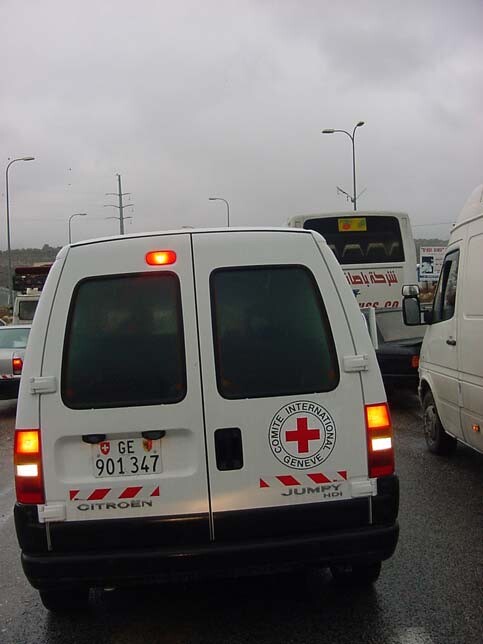
Red Cross vehicles wait at the checkpoint. (Dr. Bill Dienst)
The locals keep serving us up endless cups of tea and Arabic coffee as we plow through. At the end of the day, we make a house call to see a bedridden elderly male who had a stroke a week ago. This has left him bedridden, with slurred speech and paralysis on the left side of his body. We review the images of his CT scan, which was done in Nablus. There is no radiology report, but I believe the images show areas of low attenuation on the right side of his brain, consistent with his stroke findings on the left side of his body.
In the next room is his elderly wife, who had a bad fall 2 weeks ago; she too has been bedridden ever since. We review her X-rays, which show no hip fracture, no spinal fractures, but several fractured ribs on the right side.
If she remains bedridden, she is a set up for multiple complications (bed sores, lung collapse and pneumonia, blood clots in her legs that break off and go to her lungs, etc.) In America, we would consult home health care and physical therapy. Here in this small Palestinian village isolated by a brutal military occupation, none of these services exist.
She does have the advantage of loving support from her extended family that live in the same building. They will have to do. With Dr. Hasam translating, I explain that they need to get her a walker, and get her up and start moving her; even if it hurts a bit. Otherwise she will die soon. This elderly woman wants me to listen to her heart with my stethoscope to make sure she is “OK,” and I comply.
We walk back to the clinic. Dr. Hasam and I saw 55 patients today! Fortunately, our medical documentation emphasizes “just the facts.” We do not have to dictate or write endless pages of medical-legal silliness like we would have to if we were in America.
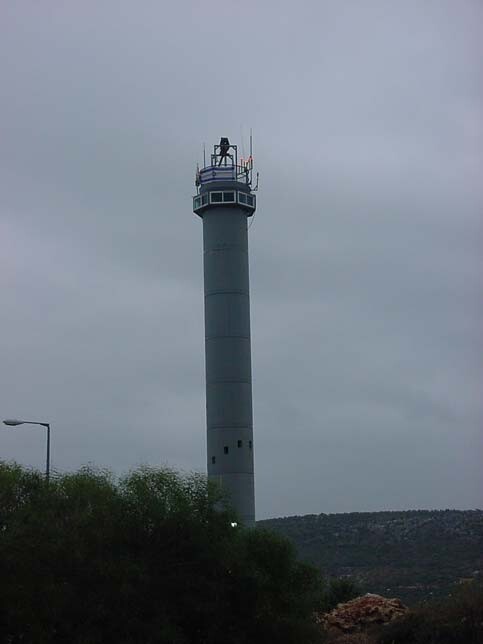
Israeli watchtower looming over the city. (Dr. Bill Dienst)
Now we head home. We drop Dr. Hasam off at his village, and continue on back to Salfit. We get back to Zatara military checkpoint and find that we are backed up by more than 200 vehicles that are barely moving. We wait a while and Khaled realizes that this is going to take more than an hour. There is no point burning gas in this miserable cue in the rain. So he turns around and we head toward the village of Kufl Haris to hang out at Dr. Hasam’s house while we wait for the back up to clear.
The entrance to Dr. Hasam’s village is located directly across the highway to the north from the main entrance for Ariel settlement to the south. The Israelis bulldozed a mound of earth and placed a concrete block in the road in front of the entrance to the village in order to make life more miserable for the villagers. They have partially succeeded. All the small cars like Fiats, etc. are parked on the village side of the mound, and these people now have to take taxis to get to bigger towns when they could previously drive. Our mobile health van has high clearance and Khaled is an excellent driver. He carefully drives us up and over the dirt mound and into the village.
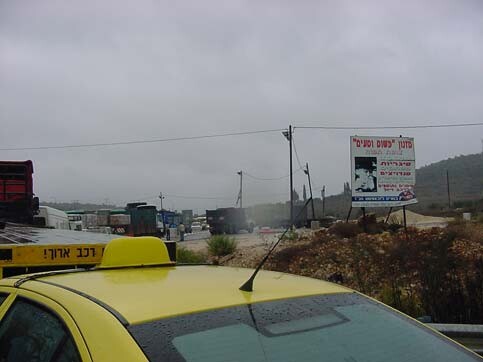
Waiting at the long queue at the checkpoint. (Dr. Bill Dienst)
We spend a couple hours at Dr. Hasam’s brother’s house. Dr. Hasam lives upstairs with his other brother and his parents. Although he is an accomplished physician and not bad looking, Dr. Hasam is 41 years old, and still unmarried, as is the brother who lives upstairs with him. A third brother lives downstairs with his wife and children. His sister-in-law serves us Arabic coffee and sweets while we wait to go home. I spend the time showing my stranded colleagues calendar pictures which demonstrate the natural beauty of Washington State, where I come from. Why does it seem like I am taunting them?
Khaled is on his mobile phone several times talking to friends who are in line at the Zatara checkpoint. He finally receives word that the gridlock is clearing. We head back, pass through the checkpoint uneventfully, and finally make it back to Salfit about 2 hours later than we would have had the checkpoint not existed.
Dr. Bill Dienst is a rural family and emergency room physician from Omak, Washington, USA.





